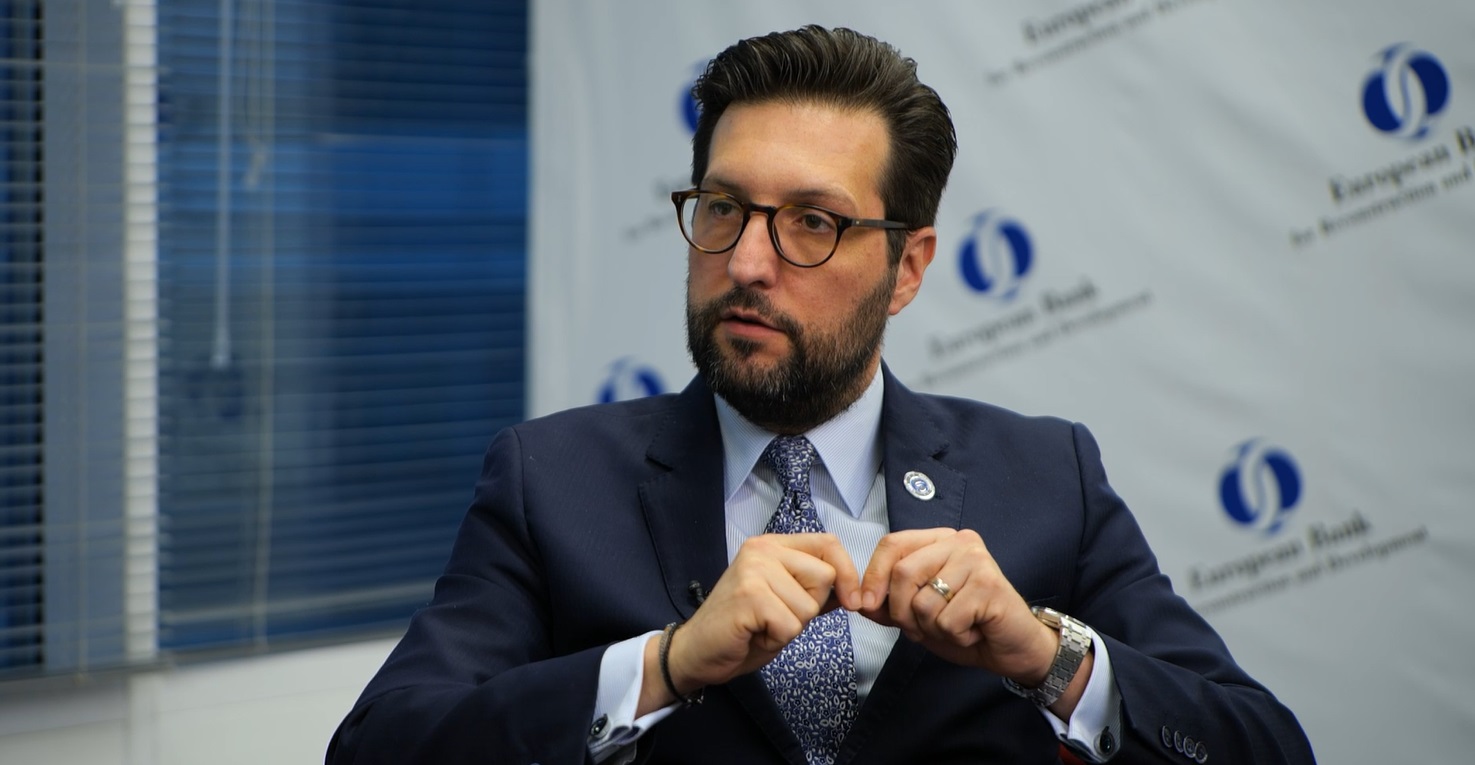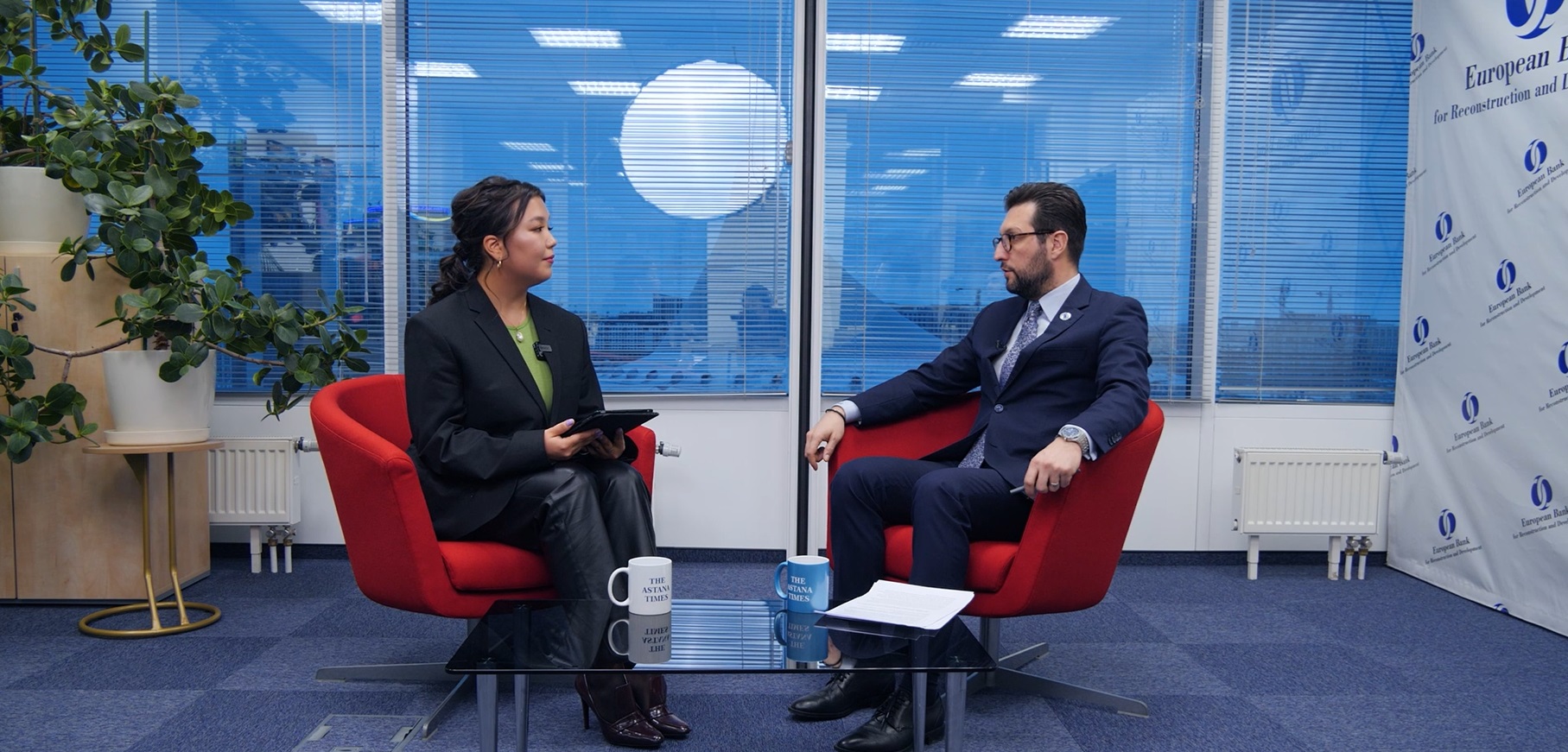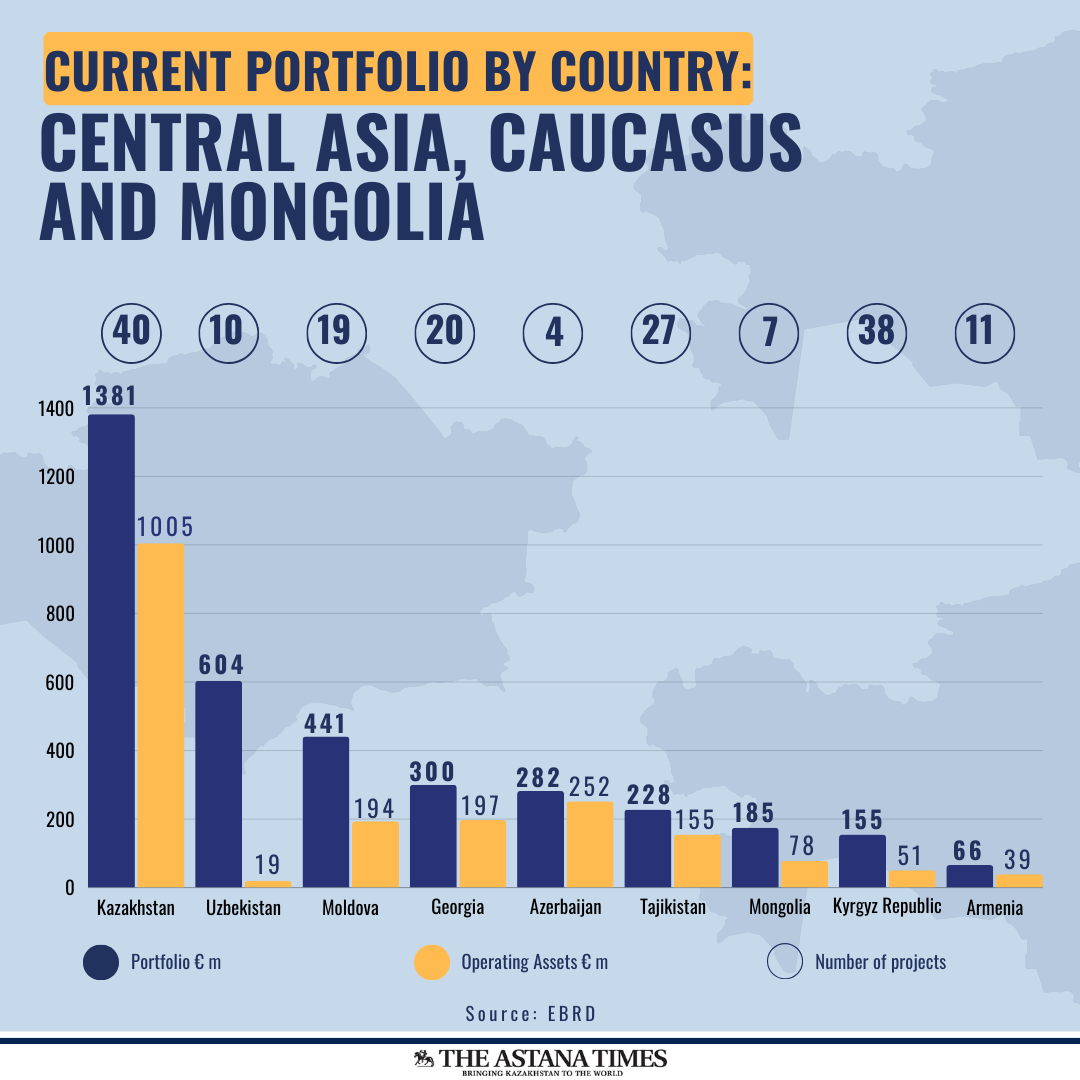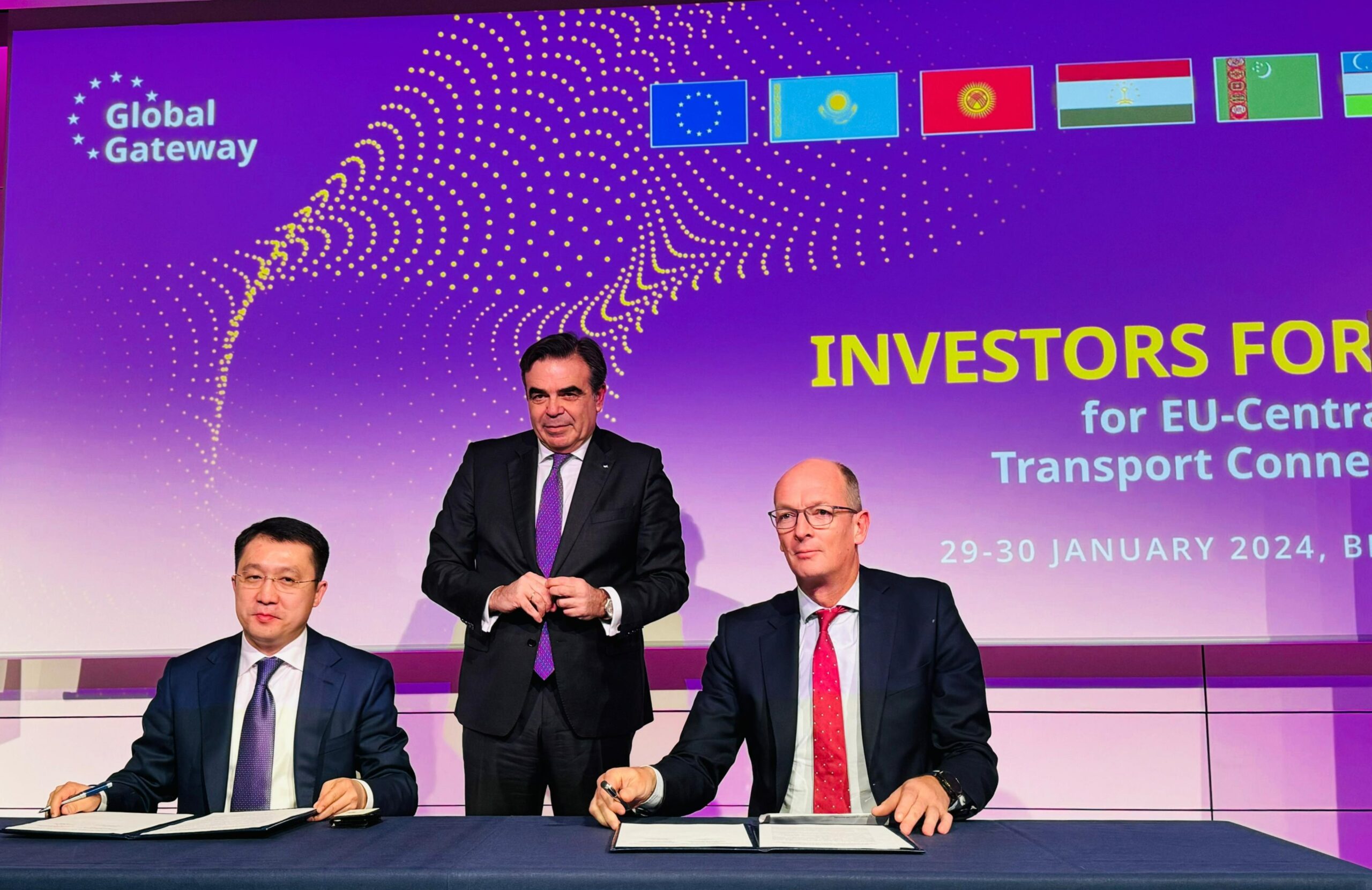ASTANA – The European Bank for Reconstruction and Development (EBRD) has signed 21 projects worth more than $450 million in Kazakhstan in 2023, said EBRD Director for Kazakhstan Hüseyin Özhan in an interview with The Astana Times. He shared his vision of the bank’s priorities and ongoing projects in Kazakhstan.

Hüseyin Özhan has been serving as EBRD Director for Kazakhstan since September 2021. Photo credit: The Astana Times
The bank’s active portfolio includes around 120 projects. In more than 30 years of partnership, EBRD has invested more than $10 billion across nearly 320 projects.
“2023, to say the least, was not an easy year. It was a difficult year for all of us. We have worked a lot,” said Özhan, who has been overseeing EBRD activities in Kazakhstan since September 2021. “We have increased the number of projects that we financed by more than 50%. We have signed 21 projects last year across many sectors, from infrastructure to energy to financial institutions to providing support to SMEs [small and medium-sized enterprises].”

The Astana Times Senior Editor Assel Satubaldina and EBRD Director for Kazakhstan Hüseyin Özhan. Photo credit: The Astana Times
Last year, 50% of the projects were on the green agenda, two-thirds of the projects had a gender and inclusivity component, and 92% were in the private sector.
“This is a record for Kazakhstan. Usually, we provide our financing to the private sector, but we also blend it with public sector projects as well,” he said.
In 2023, EBRD launched the Green Economy Financing Facility (GEFF) Kazakhstan II and invested in a local currency-denominated bond by KEGOC, the group that runs the country’s electrical system. It also provided a $39 million loan to China Power International Holding (CPIH) and Visor International for a 100-megawatt wind farm project called Shokpar in the Zhambyl Region.

EBRD’s current portfolio of transport projects. Photo credit: The Astana Times
Another $40 million loan went to Eastcomtrans, the largest private rolling stock operator, to increase their ability to handle containers at Zhetygen, one of the most congested areas near Almaty and a passage point of the Trans-Caspian International Transport Route (TITR).
Last year, EBRD also finished a project in Oskemen in eastern Kazakhstan to put in new, energy-saving LED streetlights on 150 streets.
Özhan said he is “extremely delighted” with the level of cooperation between Kazakhstan and EBRD. Last year, EBRD President Odile Renaud-Basso visited Kazakhstan, further solidifying the ties.
“I am also very proud to see the impact that EBRD has and also Kazakhstan’s movement towards further development. Kazakhstan is a ‘BBB’ investment grade country. It is our longest uninterrupted operating country in the Central Asia region,” he said.
Middle Corridor
The TITR, also known as the Middle Corridor, has been under growing attention, as countries seek to diversify transport routes to bypass Russia.

The TITR starts from China, runs through Kazakhstan, the Caspian sea, Azerbaijan, Georgia and further to European countries. Photo credit: The Astana Times
The bank participated at the EU-Central Asia Investment Forum for Transport Connectivity in Brussels in January, a high-level gathering aimed at attracting investors from Europe and facilitating dialogue among Central Asian countries, the Caucasus, and Turkiye, on transport and connectivity.
During the forum, the EBRD expressed its readiness to provide 1.5 billion euros (US$1.6 billion) for financing TITR-related projects over the next two to three years. This financial commitment is aimed at supporting infrastructure and transport projects that promise to boost the efficiency and capacity of this crucial trade route, including developing railways, ports, logistics centers and warehouses.
“For example, Aktau port is an important passage point and also a bottleneck that was identified during the big study that we have taken last year, which was funded by the EU on identifying the most efficient transit routes from east to west, from Central Asia to Europe,” Özhan said.
“There are also road projects which will be important. Shalkar – Beineu is one of them. We are working with the ministry [of transport] on some parts of Kyzylorda – Aktobe road, which will also support this route,” he continued.
A key highlight of the forum was the signing of a memorandum of understanding between the EBRD and Kazakhstan, which lays the groundwork for future collaboration on the Trans-Caspian projects, focusing on increasing freight traffic, enhancing corridor efficiency, and identifying specific investment opportunities to commercialize the infrastructure, inviting private sector participation.

Minister of Transport Marat Karabayev and EBRD Vice President for Policy and Partnerships Mark Bowman signed a memorandum of understanding at the Investors Forum in Brussels in January. Photo credit: EBRD X account
“According to this MOU, we are basically targeting how we can increase freight traffic, make this corridor more efficient and what specific investments can be undertaken and how can we commercialize the infrastructure so that the private sector can also come in,” he said, stressing the importance of leveraging private sector involvement for infrastructure development.
Kazakhstan’s strategic goal is to increase the capacity of the Middle Corridor from six million tons to 10 million tons by 2027.
EBRD study identified hard and soft infrastructure needs, requiring investments of approximately 17 billion euros (US$18.4 billion), said Özhan.
“Those bottlenecks and challenges can be summarized as some of the infrastructure starting in Kazakhstan on the railways. Some projects such as Dostyk-Moiynty, Almaty bypass, or Darbaaza-Maktaral are also the priority for Kazakhstan Temir Zholy [national railway operator]. When we look at the passageway through Caspian, the container handling capacity at Aktau and Kuryk ports needs to be increased,” he said.
Soft measures include digitalizing transport documents and customs procedures, enhanced interoperability and use of public-private partnership models.
“When you combine all of these, there are a number of challenges both on the infrastructure and soft measures, but there is also willingness, both at the country level and the stakeholders. As EBRD, we are also ready to continue our support to make this route a more efficient and reliable alternative route connecting Central Asia to Europe,” he said.
Fostering private sector development and economic inclusivity
Enhancing private sector competitiveness stands as one of the key pillars in the EBRD country strategy updated in 2022. The bank has extended financial and advisory support to SMEs, recognizing them as the backbone of the economy. The EBRD also supports projects aimed at promoting equal economic opportunities and gender equality.
In 2023, the bank launched a seven-year 200 million euro (US$218 million) Youth in Business program aimed at providing better access to finance and relevant training to young entrepreneurs in the region.
“It will provide support specifically to these businesses with technical cooperation components, advisory, financial literacy, first loss guarantee, and similar financial benefits. Using the network of banks that we work with in Kazakhstan, we will provide financing. This will increase the involvement of youth in economic activity,” said Özhan.
EBRD estimates that a mere 10% of the youth in the region have access to training and expertise, a substantial gap in the availability of equal economic opportunities for the youth in the region. Demand is substantial, he noted, emphasizing the “vibrant youth” in Kazakhstan.
Similarly, women in the region also have unequal access to economic opportunities, and this is what the EBRD seeks to address through its Women in Business program. The second phase kicked off with 150 million euro (US$162.8 million) financing for projects.
“[It includes] direct support to women-owned and women-managed businesses. It is very important to have women involved and provide support to those not only owned but managed and not only through financing but also through programs of advisory,” he said.
Özhan noted that inclusivity is not only about the underprivileged groups but also about connecting regions, addressing regional disparities, and promoting development in rural areas.
Supporting Kazakhstan’s green pathway to carbon neutrality
“Climate change, global warming, and the impacts of climate change are clear and accepted by everyone. Kazakhstan has made significant commitments. I’m also very proud that we have worked quite a lot with the authorities on the preparation of the long-term decarbonization strategy,” he said.
While there is still a heavy reliance on fossil fuels, Özhan sees a change in the perception and perspective.
“There is an understanding and there is an active movement towards this carbon neutrality – among the leadership, obviously, but also in general as well,” he said.
He also commended the nation’s commitment to increase the rollout of renewables. As of 2023, the share of renewables in the total energy mix stood at 5.9%, and the target is to reach 15% by 2030 and 50% by 2050.
“This is going to be the most important pillar towards carbon neutrality. (…) There is a plan to have 6.75 gigawatts of renewable energy auctions in the next five years. It was declared by the Ministry of Energy. There are also big projects that will be undertaken by large international investors, namely, Total Energies, Masdar, ACWA, and CPIH,” he said.
Such ambitious plans, however, require substantial investments and EBRD has played a key role in this effort. Özhan stressed the bank financed around 35% of all installed renewable capacity in the country across 15 projects.
Kazakhstan has become home
Originally from Türkiye, Özhan moved to Kazakhstan with his family in September 2021.
“It’s been more than two and a half years. My little daughter is now three and a half. She was only one when we came here. She’s almost fluent in three languages now. Seeing them grow up here is wonderful. We are living in Almaty, with a regular travel to Astana. As a family, we were very welcomed and Kazakhstan has become our home. I’m very happy to be here,” he said.
Speaking of a broader perspective, Özhan said he sees “vibrancy and change” in Kazakhstan.
“There is this movement towards further development. There is a challenging setting in the world, but it is very good to see that Kazakhstan is overcoming these challenges through the reform programs. There are a number of programs we’re seeing on the education side, (…) on decarbonization side, and something which is a bit dearer to my heart is the public private partnerships,” he said.
Özhan is optimistic about future prospects. “Looking back, one gets both very proud, and also somewhat emotional to see the development on the ground,” he said.
You can watch the full interview on our YouTube channel.

